
Commercial Evictions
We Evict
Commercial Tenants.
We’re the local lawyers that fight for small & mid-sized commercial landlords in Nassau County and Suffolk County, New York.
- Fast & Efficient
- Low Fees
- Technology Driven
- Personalized Attention
- 35+ Years Experience
- Free Consultations
Call Right Now & Speak with Our Lawyers For Free.
Learn your rights as a commercial landlord, the current process and timeframes, and get your questions answered.
What Sets Our Law Firm Apart?
-
Over 35+ Years of Litigation Experience
Our lawyers have over 35+ years of combined litigation experience fighting for commercial landlords in Town Court, District Court, Supreme Court, and even Federal Court. Our knowledge, skills, track record and experience in the local Long Island courts set us apart from all other law firms. But that's not our only difference.
-
We're commercial investors too.
We know what it's like to have a significant portion of your net worth tied up in commercial properties, and what happens to your property valuation when your rent roll decreases. It's much more than unpaid rent. A non-paying commercial tenant can dramatically affect the valuation of your asset for years to come. You need a law firm that understands the local commercial landscape, and will act fast to get your property back.
-
Affordable Flat Fees & Hybrid Rates
We're an intentionally-small, lean & mean boutique law firm. We evict tenants. That's all that we do. We don't have the overhead of a large staff or the bureaucratic billing seen in most other law firms. Because we do one thing, over and over again, we have perfected our systems to give you the most value and efficient results.
FAQs About Evicting Commercial Tenants
The timeline for a commercial eviction has many variables, and depends on the facts of each individual case. Generally, we'll want to review your lease and determine if this will be an eviction in district court or in supreme court. The real main difference is if you have a personal guarantee and you'd like to pursue a judgment against individuals based on a contract violation in addition to possession, or if you only want to pursue possession of the property back asap. This is part of the reasons we give free consultations via telephone. Call us with your details, and we'll speak with you, right now, for free. After our call you'll have a much better idea of your options, timeframe, and the process.
Many law firms will require a large retainer and bill by the hour at every touchpoint.
We take a more affordable, hybrid approach. We offer several flat rate services, as well as hourly for more expansive litigation. Give us a call to discuss your eviction matter today.
It depends on the lease, but generally not. Generally, the lease agreement will require the tenant to pay the rent on time independent of all other obligations. The tenant has other legal remedies available if you fail to make the necessary repairs, but withholding the rent is generally not one of them. If they do withhold the rent, you may bring a commercial eviction proceeding against them for failure to pay.
Evicting Commercial Tenants in New York
Evicting a commercial tenant in Nassau County or Suffolk County is never a pleasant experience. Commercial landlords face the difficult task of evicting tenants who fail to pay their rent on time, or who in other ways violate their lease agreement.
In the state of New York, commercial evictions are handled similarly to residential evictions. And much like a residential eviction, commercial landlords must follow the requirements set by law to evict their tenant.
Generally, the procedure to evict a commercial tenant in New York is to first provide the commercial tenant with the prerequisite notices required by their lease agreement and the predicate notices required by law. Then upon the expiration of the notice term, the commercial landlord can then initiate an eviction proceeding in district court, similar to a residential nonpayment proceeding or holdover proceeding. If there is a personal guarantee or similar contractual obligations the breach of which would result in monetary recovery, then Supreme Court may be an alternative venue offering more efficient relief.
Call us right now, and speak with one of our attorneys for free to learn your options.
Call or Text
Have Questions about evicitng your commercial tenant?
We offer free consultations via phone, text or chat. Don't wonder about what your rights are or what your next move is. Call and find out.
FLAT RATES - LOW FEES - IMMEDIATE ACTION.
CALL NOW FOR YOUR FREE CONSULTATION.
📞 (631) 888-6989💬 Text Us NowCommercial Tenant Evictions Based Upon a Violation of the Lease
Commercial leases are usually more complicated than residential leases, and it’s easy for a tenant to find themselves in violation of their lease. While the most common lease violation is the failure of the commercial tenant to pay rent, other violations of the lease may occur as well, such as failing to maintain the property in accordance with the requirements in the commercial lease, or failing to comply with any town or building Code requirements.
Both commercial landlords and tenants negotiate specific terms which must be followed during the commercial eviction process. Not only the payment of rent, but the obligations of the parties if there is a default. Often, there is a “notice to cure” section in the commercial lease agreement that will dictate the party’s rights and responsibilities when a lease violation occurs.
If you feel your commercial tenant is “breaking the lease,” you should first look to the terms in your commercial lease and find out what your obligations are as the landlord under the lease. If you’re not sure, you can give us a call and we’ll give you a free consultation.
Commercial Evictions Based Upon a Non-Violation of the Lease
It may be possible to evict your commercial tenant even if they pay their rent on time and otherwise abide by the lease. Certain types of behaviors might not always be expressly prohibited in a lease, but they could be severe enough to warrant an eviction. This is especially true when the commercial tenant becomes a nuisance to other tenants.
Typically nuisance-based behaviors such as harassing behavior, loud music, improper sanitation, and criminal acts may allow you to evict your commercial tenant even if they pay the rent on time. But it is much more difficult. You should speak with a commercial eviction lawyer about your situation so you can learn the options available to you.
Common Questions About Evicting a
Commercial Tenant in New York
Common Mistakes Made by Commercial Landlords When Evicting Tenants
Commercial landlords have a lot of issues to deal with when it comes to managing their properties. One of the most unpleasant tasks they may have to undertake is evicting a tenant. However, even with the best intentions, landlords can make mistakes during the eviction process that can lead to legal trouble and financial losses. Here’s the top three mistakes commercial landlords make when evicting tenants and how to avoid them.
Failing to Provide the Right Notices
The biggest mistake commercial landlords make when evicting their tenants is failing to serve the proper predicate notices properly. Commerical tenants generally receive different notices than residential tenants. Sometimes attorneys who dabble in landlord tenant law take on a commercial eviction proceeding, and they serve the incorrect notices. This leads to the dismissal of your commercial eviction case.
There are strict legal requirements that must be followed with all commercial evictions, and every mistake can cost you thousands of dollars in missed revenue. This is why it’s so important to have an experienced commercial evictions lawyer on your side.
Failing to Follow the Terms in the Commercial Lease
You had your commercial tenant sign a lease when they moved in. Often commercial landlords make the mistake of trying to evict their commercial tenant without referring to the terms and requirements in their lease. If you fail to abide by one of the requirements in the lease during the commercial eviction process, your case could be thrown out, and you’ll have to start all over again.
What is Considered a Commercial Property?
A commercial property is any real property that is not zoned for residential use only and does not contain dwellings. This definition covers stores, warehouses, and lots including parking lots.
Evicting a commercial tenant can be an expensive and time-consuming process if you have the wrong representation. A knowledgeable and experienced commercial eviction lawyer can help to keep the unpleasantness to a short minimum. If you’re a landlord that has a commercial tenant that stopped paying rent, give us a call right now, and let’s talk about your options, the costs, and the process.
More About The Commercial Evictions Process
What’s the Penalty for Renting an Illegal Apartment?
Renting an illegal apartment can lead to serious consequences, but it may...
Read MoreHow Long Does it Take to Evict a Tenant in Nassau County or Suffolk County, NY?
The Evictions Timeframe Varies Depending on on Several Factors There is no...
Read More


